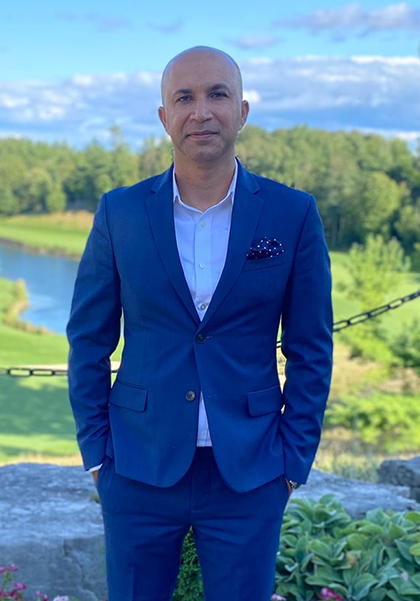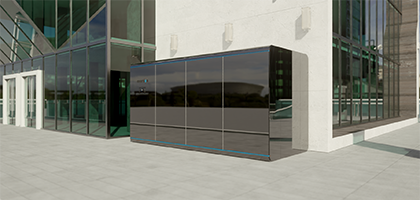Cool customer

Hanif Montazeri, the CEO of Canadian cleantech company Enersion, on why a warming world needs a greener cooling system, making inroads into the Middle East and developing world, and what inspired him.
When Hanif Montazeri was a teenager in Iran, he and his younger brother Ali made toy trucks and other electronic gadgets for their friends and neighbours. But they had dreams of developing other even more high-tech products that they could one day sell around the world.
Today, Montazeri is on the cusp of making those teenage dreams become a reality with Enersion, the Toronto-based cleantech company that he and four others—including his brother—co-founded in 2016.

Hanif Montazeri, co-founder and CEO of Enersion.
The "gadget" Montazeri and his team have built is called the Tri-Generation system: a sleek grey box about twice the size of a typical home air-conditioning unit that converts sunlight or natural gases into electricity and can heat and cool air and water.
Montazeri, who is Enersion's CEO and an instructor in the University of Toronto's department of mechanical and industrial engineering, calls the Tri-Generation system efficient, economical and nearly emission-free.
"Our system captures wasted heat from solar panels or gas-powered units—and by that I mean natural gas, biogas and hydrogen—and converts it into cooling and heating and electricity," he explains. "It can save you up to 70% of your total energy bills and is emission-free if it's paired with hybrid solar panels that convert solar energy into electricity and heat."
Enersion (the name is a combination of the words energy and conversion) will bring its technology to the world in November at , where the company is part of the Expo Live program, which showcases global innovators.
On being at Expo 2020 Dubai
It's great, because as one of the Expo Live Global Innovators, we're coming full circle in our association with Expo 2020 Dubai. In 2017, we presented our idea to them and they liked it because it was so relevant to the developing world, where cooling is often considered a luxury. They then selected us for their Innovation Impact Grant Programme, which provided some of the original seed money that has helped build the company.
On the heart of the Tri-Generation system's technology
Providing heat and electricity is great, but it's the warmer months where our system really shines, and that's because we're able to convert hot water directly to cooling. We do this by using nanoporous materials and a process called adsorption. Nanoporous material is so tiny and so porous that just six grams of it have the same surface area as a football field. That means that more water vapour can stick—or adsorb—to the material's surface. Think of this material as a kind of thermal sponge that soaks up the heat, cooling your house in the process.
On the inspiration behind the technology
Where do I begin! There were the dreams my brother and I had when we were teenagers in Iran. I kept those dreams alive as an engineering student, and was always looking for an opportunity to develop a product. But one didn't come along until 2015, when I was doing some work on adsorption with Enersion co-founder Arshan Singh. When we realized we could use nanoporous material to produce cooling, I remember thinking, 'Well, this is just way too cool to be ignored!'
When we realized our theoretical work could actually become a physical product, we set off on a whole new path as engineer-entrepreneurs. I think the ultimate reward for us is knowing that we've built something useful, something that people look at and say, "Hey, you know what? This is can improve our lives."
On the drawbacks of "old" cooling technologies
The biggest problem is the use of synthesized refrigerants, which are poisonous and a source of global warming. It's been estimated that refrigeration and air conditioning cause 10% of global greenhouse gas emissions. So what's going to happen when more people in developing countries start using these systems as the world gets hotter? Global warming will likely accelerate significantly because you're now talking about billions of people.
The second problem is economic. Cooling is expensive because it's an electricity-hungry technology. We all know our electricity bills shoot up in the summer, when you use your air conditioner. And look at places like data centres, where close to 30% of the energy bill goes toward cooling.
Our technology gets around these problems because it doesn't use electricity; it uses waste heat, a by-product of electricity generation.
On where the Tri-Generation system could be used

The commercial version of Enersion's Tri-Generation system.
It could be used anywhere from homes to hospitals, or any building, really. But right now, we're going after larger-scale commercial buildings. For example, a data centre in Toronto used our technology and saved 83% on its electricity bills. We're currently working a natural-gas-powered system for an indoor farm in Alberta, and are in discussions with some indoor farms in the United Arab Emirates and Saudi Arabia.
On other helping hands
Our association with Expo 2020 Dubai was one of the most important things to happen to us. But being in Canada is a blessing because the innovation ecosystem here is amazing. In our case, for example, we got a $30,000 grant from Northumberland Community Futures Development Corporation's N1M program in Ontario, funding from the Ontario Centre of Innovation and Sustainable Development Technology Canada, and fantastic support from Canada's Trade Commissioner Service and its Canadian Technology Accelerators program.
On the challenges ahead
We're a hardware company, and raising money for a hardware company is enormously difficult right now because so many investors put their money into software companies, which don't require a lot of capital.
But I don't think we can provide solutions to the world's biggest problems—problems such as climate change—without hardware. It's almost impossible. Look at Elon Musk, who I think is the best entrepreneur out there. He's a software guy who ended up building two successful hardware companies: Tesla and SpaceX. So I'm not giving up!
- Date modified: